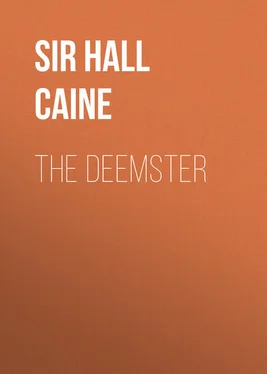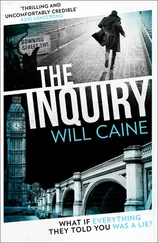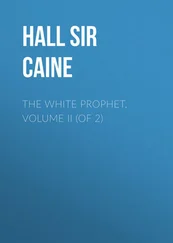Hall Caine - The Deemster
Здесь есть возможность читать онлайн «Hall Caine - The Deemster» — ознакомительный отрывок электронной книги совершенно бесплатно, а после прочтения отрывка купить полную версию. В некоторых случаях можно слушать аудио, скачать через торрент в формате fb2 и присутствует краткое содержание. ISBN: , Жанр: foreign_antique, foreign_prose, на английском языке. Описание произведения, (предисловие) а так же отзывы посетителей доступны на портале библиотеки ЛибКат.
- Название:The Deemster
- Автор:
- Жанр:
- Год:неизвестен
- ISBN:http://www.gutenberg.org/ebooks/35781
- Рейтинг книги:5 / 5. Голосов: 1
-
Избранное:Добавить в избранное
- Отзывы:
-
Ваша оценка:
- 100
- 1
- 2
- 3
- 4
- 5
The Deemster: краткое содержание, описание и аннотация
Предлагаем к чтению аннотацию, описание, краткое содержание или предисловие (зависит от того, что написал сам автор книги «The Deemster»). Если вы не нашли необходимую информацию о книге — напишите в комментариях, мы постараемся отыскать её.
The Deemster — читать онлайн ознакомительный отрывок
Ниже представлен текст книги, разбитый по страницам. Система сохранения места последней прочитанной страницы, позволяет с удобством читать онлайн бесплатно книгу «The Deemster», без необходимости каждый раз заново искать на чём Вы остановились. Поставьте закладку, и сможете в любой момент перейти на страницу, на которой закончили чтение.
Интервал:
Закладка:
It was winter when Gilcrist Mylrea was appointed to reach the island, but he wrote that his wife's health was failing her, that it was not unlikely that she was to bear a child, and that he preferred to postpone his journey until the spring. Before the gorse bushes on the mountains had caught their new spears of green, and before the fishermen of Peeltown had gone down to the sea for their first mackerel, Thorkell's wife was lying in her last illness. She sent for her husband and bade him farewell. The Deemster saw no danger, and he laughed at her meek adieu. She was soon to be the mother of another of his children – that was all. But she shook her head when he rallied her, and when he lifted the little creeping, cooing, babbling Ewan from the floor to his mother's bed, and laughed and held up his long, lean, hairy finger before the baby face and asked the little one with a puff how he would like a little sister, the white face on the pillow twitched and fell, and the meek eyes filled, and the shadow was over all.
"Good-by, Thorkell, and for baby's sake – "
But a shrill peal of Thorkell's laughter rang through the chamber, and at the next instant he was gone from the room.
That day the wife of the Deemster passed beyond the sorrows of the life that had no joys. The angels of life and death had come with linked hands to the new homestead of Ballamona, and the young mother had died in giving birth to a girl.
When the Deemster heard what had happened, his loud scream rang through every room of the house. His soul was in ferment; he seemed to be appalled, and to be stricken, not with sorrow, but with fright and horror.
"She's dead; why, she's dead, she's dead," he cried, hysterically; "why did not somebody tell me that she would die?"
The Deemster buried his wife by the side of old Ewan, under the elder-tree that grew by the wall of the churchyard that stands over by the sea. He summoned no mourners, and few stood with him by the open grave. During the short funeral, his horse was tied to the cross-timbers of the lych-gate, and while the earth was still falling in hollow thuds from the sexton's spade, Thorkell got into the saddle and rode away.
Before sunset he waited by the wooden landing jetty at Derby Haven. The old sea-tub, the "King Orry," made the port that day, and disembarked her passengers. Among them was the new Bishop of Man, Gilcrist Mylrea. He looked much older for the six years he had been away. His tall figure stooped heavily; his thick hair fell in wavelets on his shoulders, and was already sprinkled with gray; his long cheeks were deeply lined. As he stepped from the boat on to the jetty he carried something very tenderly in his arms. He seemed to be alone.
The brothers met with looks of constraint and bewilderment.
"Where is your wife?" asked Thorkell.
"She is gone," said Gilcrist. "I have nothing left of her but this," and he looked down at the burden at his breast.
It was a baby boy. Thorkell's face whitened, and terror was in his eyes.
CHAPTER V
THE MANXMAN'S BISHOP
Gilcrist Mylrea had been confirmed Bishop, and consecrated in England; but he had to be installed in his cathedral church at Peeltown with all the honors of the insular decrees. The ceremony was not an imposing one. Few of the native population witnessed it. The Manxman did not love the Church with a love too fervent. "Pazon, pazon," he would say, "what can you expect from the like o' that? Never no duck wasn't hatched by a drake."
It was no merit in the eyes of the people that the new Bishop was himself a Manxman. "Aw, man," they would say, "I knew his father," and knowledge of the father implied a limitation of the respect due to the son. "What's his family?" would be asked again and again across the hearth that scarcely knew its own family more intimately. "Maybe some of the first that's going," would be the answer, and then there would be a laugh.
The Bishop was enthroned by Archdeacon Teare, who filled his function with what grace his chagrin would allow. Thorkell watched his father-in-law keenly during the ceremony, and more than once his little eyes twinkled, and his lips were sucked inward as if he rolled a delectable morsel on his tongue. Archdeacon Teare was conscious of the close fire of his son-in-law's gaze, and after the installation was done, and the clergy that constituted priests and congregation were breaking up, he approached the Deemster with a benevolent smile, and said, "Well, Thorkell, we've had some disagreements, but we'll all meet for peace and harmony in heaven."
The Deemster tittered audibly, and said, "I'm not so sure of that, though."
"No?" said the Archdeacon, with elevated eyebrows. "Why – why?"
"Because we read in the Good Book that there will be no more tears , Archdeacon," said Thorkell, with a laugh like the whinny of a colt.
The Bishop and his brother, the Deemster, got on their horses, and turned their heads toward the episcopal palace. It was late when they drove under the tall elms of Bishop's Court. The old house was lighted up for their reception. Half-blind Kerry Quayle had come over from Ballamona to nurse the Bishop's child, and to put him to bed in his new home. "Och, as sweet a baby boy as any on the island, I'll go bail, as the old body said," said Kerry, and the Bishop patted her arm with a gentle familiarity. He went up to the little room where the child lay asleep, and stooped over the cot and touched with his lips the soft lips that breathed gently. The dignity of the Bishop as he stood four hours before under the roof of St. German's had sat less well on this silent man than the tenderness of the father by the side of his motherless child.
Thorkell was in great spirits that night. Twenty times he drank to the health of the new Bishop; twenty times he reminded him of his own gracious offices toward securing the bishopric to one of his own family. Gilcrist smiled, and responded in few words. He did not deceive himself; his eyes were open. He knew that Thorkell had not been so anxious to make him a Bishop as to prevent a place of honor and emolument from going to any one less near to himself than his own brother. "Near is my shirt," as Thorkell had told the Archdeacon, "but nearer is my skin."
Next day the Bishop lost no time in settling to his work. His people watched him closely. He found his palace in a forlorn and dilapidated state, and the episcopal demesne, which was about a square mile of glebe, as fallow as the rough top of the mountains. The money value of this bishopric was rather less than £500 a year, but out of this income he set to work to fence and drain his lands, plant trees, and restore his house to comfort, if not to stateliness. "I find my Patmos in ruins," he said, "and that will oblige me to interrupt my charity to the poor in some measure."
He assumed none of the social dignity of a Bishop. He had no carriage, and no horse for riding. When he made his pastoral visitations he went afoot. The journey to Douglas he called crossing the Pyrenees; and he likened the toilsome tramp across the heavy Curraghs from Bishop's Court to Kirk Andreas to the passing of pilgrims across a desert. "To speak truth," he would say, "I have a title too large for my scant fortune to maintain."
His first acts of episcopal authority did not conciliate either the populace or their superiors in station. He set his face against the contraband trade, and refused communion to those who followed it. "Och, terrible, wonderful hard on the poor man he is, with his laws agen honest trading, and his by-laws and his customs and his canons and the like o' that messing."
It was soon made clear that the Bishop did not court popularity. He started a school in each of the parishes by the help of a lady, who settled a bounty, payable at the Bishop's pleasure, for the support of the teachers. The teachers were appointed by his vicars-general. One day a number of the men of his own parish, with Jabez Gawne, the sleek little tailor, and Matthias Jubman, the buirdly maltster, at their head, came up to Bishop's Court to complain of the schoolmaster appointed to Kirk Michael. According to the malcontents, the schoolmaster was unable to divide his syllables, and his home, which was the schoolhouse also, was too remote for the convenience of the children. "So we beseech your Lordships," said little Jabez, who was spokesman, "to allow us a fit person to discharge the office, and with submission we will recommend one ." The Bishop took in the situation at a glance; Jabez's last words had let the cat out of the bag, and it could not be said to be a Manx cat, for it had a most prodigious tail. Next day the Bishop went to the school, examined master and scholars, then called the petitioners together, and said, "I find that James Quirk is qualified to teach an English school, and I can not remove him; but I am of your opinion that his house is in a remote part of the parish, and I shall expect the parishioners to build a new schoolhouse in a convenient place, near the church, within a reasonable time, otherwise the bounty can not be continued to them." The answer staggered the petitioners; but they were men with the saving grace of humor, and through the mouth of little Jabez, which twisted into curious lines, they forthwith signified to his Lordship their earnest desire to meet his wish by building their schoolhouse within the churchyard.
Читать дальшеИнтервал:
Закладка:
Похожие книги на «The Deemster»
Представляем Вашему вниманию похожие книги на «The Deemster» списком для выбора. Мы отобрали схожую по названию и смыслу литературу в надежде предоставить читателям больше вариантов отыскать новые, интересные, ещё непрочитанные произведения.
Обсуждение, отзывы о книге «The Deemster» и просто собственные мнения читателей. Оставьте ваши комментарии, напишите, что Вы думаете о произведении, его смысле или главных героях. Укажите что конкретно понравилось, а что нет, и почему Вы так считаете.












